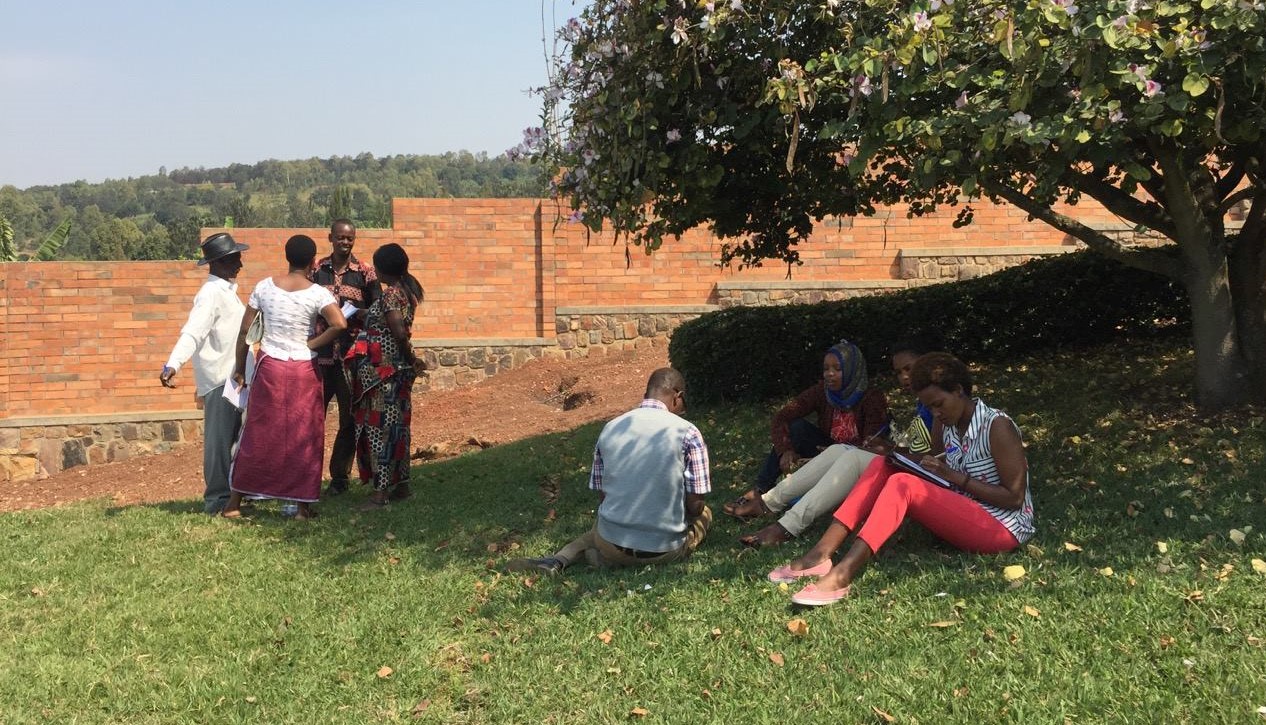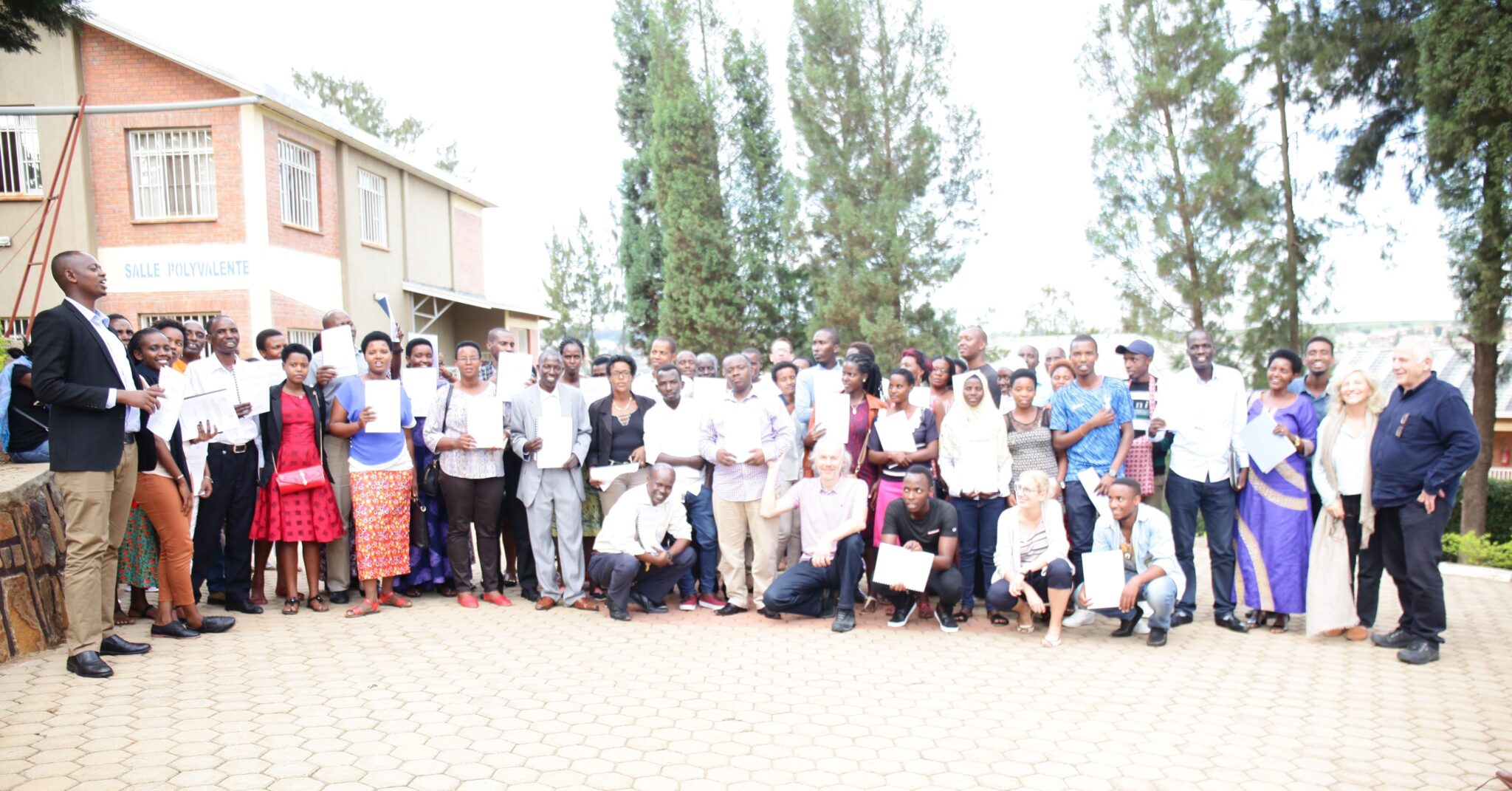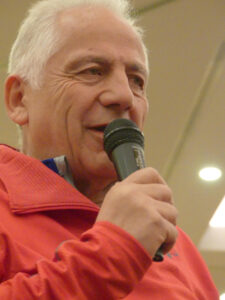Our Programme in Rwanda and the Great Lakes
CFOR is implementing a programme together with Innocent Musore of GER Global Initiatives for the Environment and Reconciliation in Rwanda, and in cooperation with the NURC, National Unity and Reconciliation Commission. The programme supports the ongoing work of reconciliation, violence prevention and community recovery, in the aftermath of the 1994 genocide.
Innocent made contact with Arlene and Jean-Claude, CFOR’s Founders, with a dream of making a contribution to his country and the Great Lakes region – asking if we might work with him to bring CFOR’s programme of post-conflict recovery and violence prevention to Rwanda, and potentially to Burundi and the DRC. Innocent then came to the UK to take part in our Intensive course.
The programme has been underway since 2016, and participants include perpetrators and victims of violence, community members as well as those working within organisations to support recovery – all dealing with their own personal experience, the legacy of the genocide and the current needs of communities. Forum participants include youth and elders, local authorities, government and community groups.
Throughout society, there is a profound impact of the 1994 genocide against Tutsi, including on the next generation, children of survivors and perpetrators and those born from rape. In our forum interactions, survivors and perpetrators say again and again, that they would never have dreamed such interaction is possible, and that it transforms their lives and outlook. Young people tell their elders that they are hungry to learn about what happened, so as to not inherit the legacy of violence in the next generation.
In post-conflict zones, community wide trauma can easily fuel fresh rounds of violence. Our experience applying ‘worldwork’ methods in post-conflict zones is that with facilitation, communities have a profound capacity and resilience to be able to meet, and process history together, so as to not fall victim to repeating rounds of violence, but rather to find shared pathways forward for recovery and violence prevention.
Mr. Musore’s vision is to bring this work to Rwanda in a way that supports the on-going National Reconciliation processes and the work of communities throughout the country.
Since 2016, our programme has reached many hundreds of participants. It is coordinated by Innocent Musore of GER in cooperation with Local and National Authorities. It has included five large forums, facilitated by Arlene and Jean-Claude Audergon, each lasting four days, held in 3 Districts (Kicukiro, Gasabo, Bugasera). We also held an additional 5 x 2 day Modular Training programme for a selected group of 60 participants. We also facilitated special forums, including for women who wanted to meet among themselves to talk about sexual violence; with Congolese refugees in a camp in Rwanda; and for religious leaders who wanted to grapple with their own accountability in the genocide, and role in supporting their communities. The forums and trainings were filmed.
Following our last four-day Forum in Bugasera in November 2018 with 200 participants, and our last training module in Kicukiro, we set up community facilitator groups. Each group developed community projects, and met during 2019, with support from GER. In 2020, during the pandemic, GER continued to stay in touch with these community facilitators. In 2021, with mentoring from CFOR, GER with continued engagement from the community facilitators led in-person forum meetings for youth. During this time, the programme expanded to 2 new Districts (Rwamagana, Ruhango), while the Musanze District was planned but on hold due to COVID-19 restrictions.
Since 2022, we have been focusing on two new projects in 6 mentioned Districts (Kicukiro, Gasabo, Bugasera, Musanze, Rwamagana, Ruhango). One is focused on the role of youth in the process of reconciliation, violence prevention and community building. A particular focus is the relationships between those youth who are children of perpetrators, and those who are children of survivors, as well as their heartfelt compassion and challenge towards the elder generation, and desire to deepen the process of reconciliation. The other project focuses on grappling with issues of gender – with a particular focus also on young people – as an essential link to processing the legacy of violence and processes of reconciliation, to prevent future violence.
Reports and Summaries
Please find our reports and summaries related to the programme in Rwanda listed below:
- Read the GER & CFOR 2016 – 2025 Report, for an overview of the programme
- Read the full 2021 report ‘Healing the past, facilitating the future: Interactions with the post genocide generation’
- Read about the activities of ‘The Next Generation Project 2021’ Healing post genocide generation: Interaction held in Gahanga-Kicukiro
- See The Next Generation: Rwanda Project 2021
- Read about Healing and Reconciliation Experiences of Community Facilitators in Gasabo, Bugesera and Kicukiro Districts
- The latest report 2019- 2020: Trainees applying their learnings to community-level reconciliation.
- Report of Trainee facilitator activities supporting reconciliation at a community level in the Districts of Gasabo, Kicukiro and Bugesera, 2019.
- Participants of GER and CFOR’s Programme were invited to speak at the Rwanda’s 2019 International Day of Peace celebration in Parliament. Please read more about it here.
- CFOR-GER Beyond Conflict Rwanda 2018 full report.
- GER’s report: Masaka Mass Graves Kicukiro Kigali, July 2018.
- Summary of Forums in June 2017 and November 2017, Kigali, Rwanda.
- One page summary of June 2016 Forum in Kigali, Rwanda.
- The full report of the June 2016 Forum in Kigali, Rwanda.
Documentary Films and Articles
CFOR is dedicated to sharing the work done in Rwanda through filming and writing.
Visit our page with documentary films, explore and watch the films to find out more.
Also, read the article: Audergon & Audergon, ‘Contribution of worldwork methodology for violence prevention and community recovery after mass violence: An example from Rwanda’, in Psychotherapy and Politics International, John Wiley and Sons.GE














